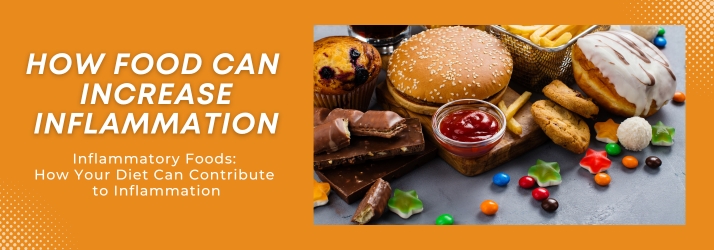How Food Can Increase Inflammation

The food we eat plays a significant role in determining the level of inflammation in our body. Some foods can contribute to inflammation, while others can help to reduce it. Understanding the impact of food on inflammation is essential for maintaining optimal health and well-being. In this article, we will explore how certain foods can increase inflammation in the body and discuss healthier alternatives that can help combat it.
- Refined Carbohydrates
Refined carbohydrates, such as white bread, pasta, and pastries, can contribute to inflammation. These foods have a high glycemic index, which means they can cause a rapid spike in blood sugar levels. This increase in blood sugar can lead to the production of pro-inflammatory molecules called cytokines. Instead, opt for whole grains like brown rice, quinoa, and whole wheat bread, which have a lower glycemic index and higher fiber content. - Added Sugars
Consuming high amounts of added sugars, found in sodas, candies, and other processed foods, can promote inflammation in the body. Excessive sugar intake can lead to weight gain and increased production of pro-inflammatory cytokines. To reduce inflammation, limit your intake of added sugars and choose natural sweeteners like honey or maple syrup in moderation. - Trans Fats
Trans fats, found in some processed and fried foods, can increase inflammation by promoting the production of inflammatory molecules and damaging the endothelial lining of blood vessels. Look for products labeled "trans fat-free" or "no trans fats" and choose healthier cooking oils like olive or avocado oil. - Saturated Fats
Saturated fats, found in red meat, full-fat dairy products, and some processed foods, can contribute to inflammation by stimulating the production of pro-inflammatory cytokines. However, not all saturated fats are created equal, and some sources, like coconut oil and dark chocolate, may have health benefits. Opt for lean protein sources like poultry, fish, and plant-based alternatives, and choose low-fat dairy products to reduce inflammation. - Omega-6 Fatty Acids
While omega-6 fatty acids are essential for normal body function, excessive intake can contribute to inflammation. Omega-6 fatty acids are found in vegetable oils, such as corn, soybean, and sunflower oils, and many processed foods. To reduce inflammation, aim for a balanced ratio of omega-6 to omega-3 fatty acids by incorporating more omega-3-rich foods like fatty fish, walnuts, and flaxseeds into your diet. - Alcohol
Excessive alcohol consumption can cause inflammation by increasing the production of pro-inflammatory cytokines and damaging the liver. To minimize inflammation, limit your alcohol intake and choose healthier beverage options like water, herbal tea, or freshly squeezed fruit juices. - Processed and Fried Foods
Processed and fried foods often contain high levels of unhealthy fats, added sugars, and artificial additives, which can contribute to inflammation. These foods can also lead to weight gain and exacerbate inflammation-related health issues. Choose whole, unprocessed foods and use healthier cooking methods like baking, grilling, or steaming to reduce inflammation.
The foods we consume play a crucial role in determining the level of inflammation in our body. By understanding how certain foods can contribute to inflammation and making healthier dietary choices, we can help to reduce inflammation and promote overall health and well-being. Focus on incorporating anti-inflammatory foods, such as fruits, vegetables, whole grains, lean proteins, and healthy fats, into your diet, and consult a nutritionist or healthcare professional for personalized guidance if needed.
OFFICE HOURS
Monday
8:30am - 11:45am
12:30pm - 4:00pm
Tuesday
11:00am - 2:45pm
3:30pm - 7:00pm
Wednesday
11:00am - 2:45pm
3:30pm - 7:00pm
Thursday
11:00am - 2:45pm
3:30pm - 7:00pm
Friday
8:30am - 11:45am
12:30pm - 4:00pm
Saturday
8:30am - 11:45am
12:30pm - 4:00pm
Sunday
Closed
Reform Chiropractic
10345 Lakewood Blvd
Downey, CA 90241



